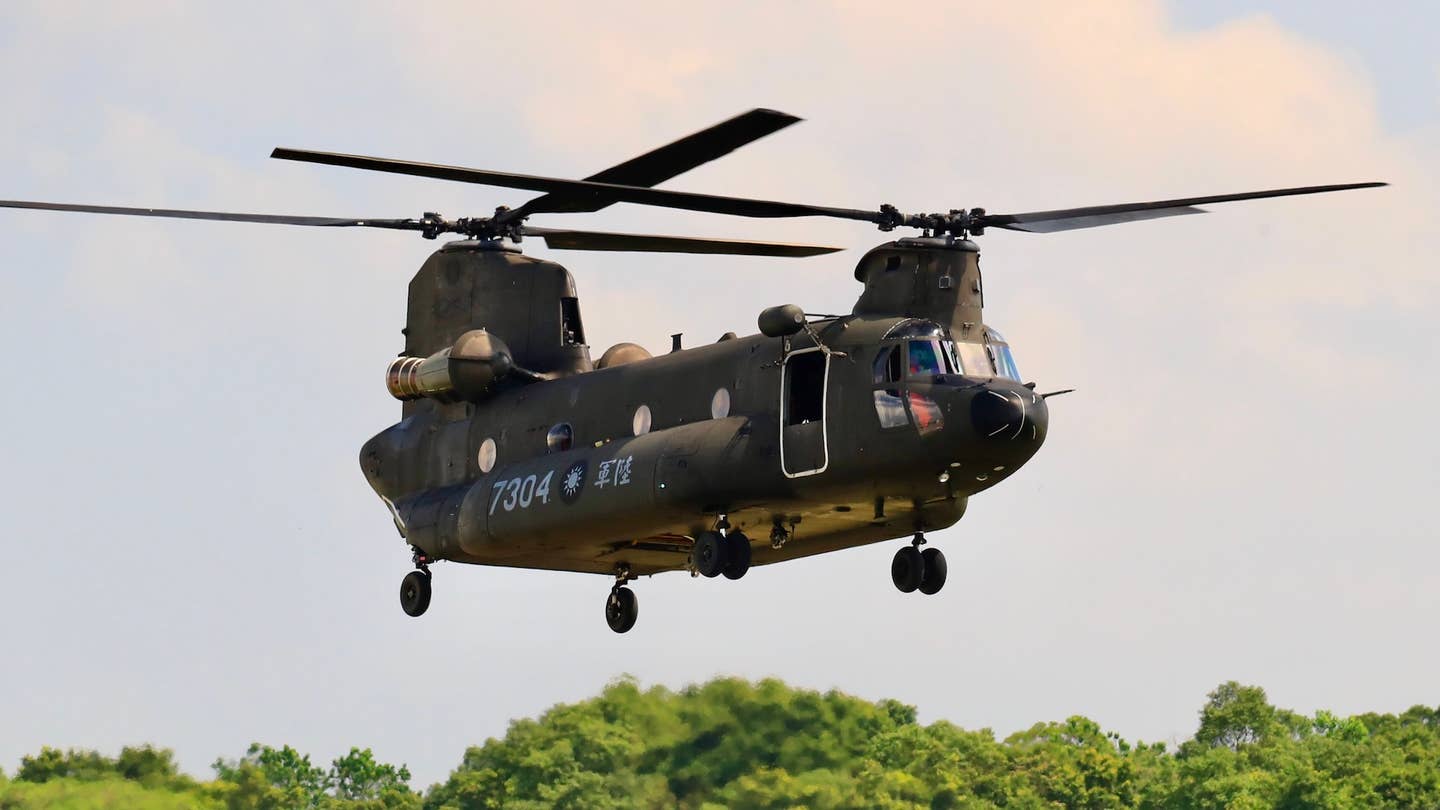As part of the plot, the pilot was also allegedly offered safe passage for his family to Thailand should a Chinese invasion of Taiwan occur.

A Taiwanese pilot, allegedly planning to defect to the People’s Republic of China (PRC), was reportedly offered $15 million USD to deliver a CH-47 Chinook helicopter to the People’s Liberation Army Navy (PLAN). As part of the defection scheme, the individual was supposedly set to land the Chinook on a PLAN vessel in the Taiwan Strait. Along with the money offered, the pilot was also apparently assured by Chinese officials that his family would be given safe passage out of Taiwan should a potential conflict between the country and China erupt.
The pilot in question has been named as Lt. Col. Hsieh of the Republic of China Army (ROCA) as part of an indictment released by Taiwan’s High Court Prosecutors Office today. Hsieh was arrested back in August following a tip-off, a Taiwan court heard today, which foiled the defection scheme. According to reports, Hsieh — as well as a wider spy ring within the Taiwanese military connected to his defection — has been on the radar of Taiwanese law enforcement since the spring. Prior to today’s revelations, lawmakers previously indicted a group of active and retired Taiwanese officers on November 27 on the grounds of spying for Beijing.
As per reporting by the South China Morning Post, Hsieh was originally approached in June by alleged Chinese intelligence officials via a retired ROCA officer. As part of his defection scheme, Hsieh was set to fly a CH-47SD Chinook helicopter — of which the ROCA currently has roughly eight of — onto a People’s Liberation Army Navy (PLAN) vessel in the Taiwan Straight. Which PLAN vessel this pertains to remains unclear, although multiple outlets suggest it was to have been one of China’s two existing aircraft carriers; either Type 001 Liaoning or Type 002 Shandong.
Hsieh suggested that the PLAN perform naval drills close to the port city of Kaohsiung in southern Taiwan in advance of his defection, prosecutors contend. This was suggested in order to prevent the lieutenant colonel from having to cross the sensitive “median line” which bisects the Taiwan Strait and serves as a de facto boundary between mainland China and Taiwan.
Circumventing the median line would have minimized the chances of the Chinook being intercepted by Republic of China Air Force (ROCAF) fighters on its way to the PLAN vessel, prosecutors argue.
Kaohsiung seen in relation to Taiwan and mainland China. Google Maps
“According to the instruction from the [mainland] agents, Lieutenant Colonel Hsieh was asked to fly the helicopter at low altitude along the coastline to the Chinese Communist carrier which would be staging drills close to the waters 24 nautical miles off [Taiwan],” the indictment reads, as per the South China Morning Post.
It isn’t clear what would have happened to the other crew on the Chinook as the type always flies with a second pilot and crew chiefs.
Why China would want this helicopter isn’t perfectly clear, but the PLA does not fly a tandem rotor type at this time, but they are surely looking to develop improved heavy-lift designs. The CH-47SD model is something of a precursor to more recent models of the Chinook, which would have made it even more enticing for reverse engineering purposes. The avionics onboard as well as the crew’s potential intelligence value could have also been attractive.
In terms of financial compensation, Hsieh was initially offered $6,355 USD per month, equivalent to some $200,000 in New Taiwan Dollars (NTD), to defect and deliver the helicopter. However, he declined the offer, owing to the significant risks involved. A counter-offer of $15 million USD, which reports suggest came to half the overall cost of the helicopter, along with a $1 million USD “deposit” was subsequently agreed between Hsieh and Chinese officials, according to the indictment.
From the start, it was agreed by the mainland side that Hsieh’s wife and children would be helped to emigrate to Thailand — specifically via sourcing Thai visas — should a potential invasion of Taiwan by China occur in the near future. According to Taiwanese prosecutors, Hsieh conducted a teleconference with Chinese operatives in July to discuss the details of the defection, as well as contingency plans for his family’s emigration to Thailand.
Of course, China has a track record of courting Taiwanese military officers to defect, prompting efforts by Taiwan’s law makers to clamp down on its neighbors’ ability to steal sensitive information. Speaking to lawmakers today, Taiwan’s Defense Minister Chiu Kuo-cheng said of Hsieh’s indictment, “I feel pained too, to have discovered a case like this and those allegedly involved must be dealt with according to the law.”
A separate investigation has been completed by Taiwan’s military and security agencies into Hsieh’s case, the country’s Ministry of Defense noted.
However, the revelation that Hsieh discussed with PRC officials plans for his family to emigrate to Thailand underscores fears of a possible Chinese intervention in Taiwan in the minds of Taiwanese military officials. The promise of hefty payments and lavish gifts alone may, on its own, provide less weight in enticing defectors to China going forward given said concerns.
While legal proceedings connected to Hsieh’s alleged espionage activities have only just begun, the new revelations no doubt point to a broader and potentially troubling range of factors motivating Taiwanese military officials to defect to China.



